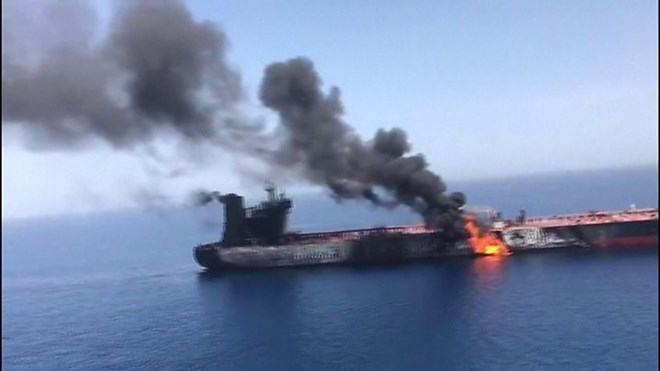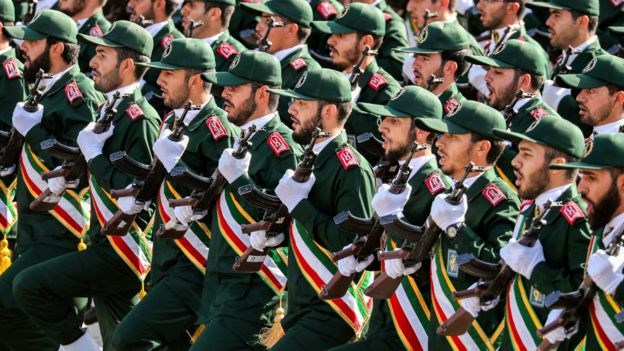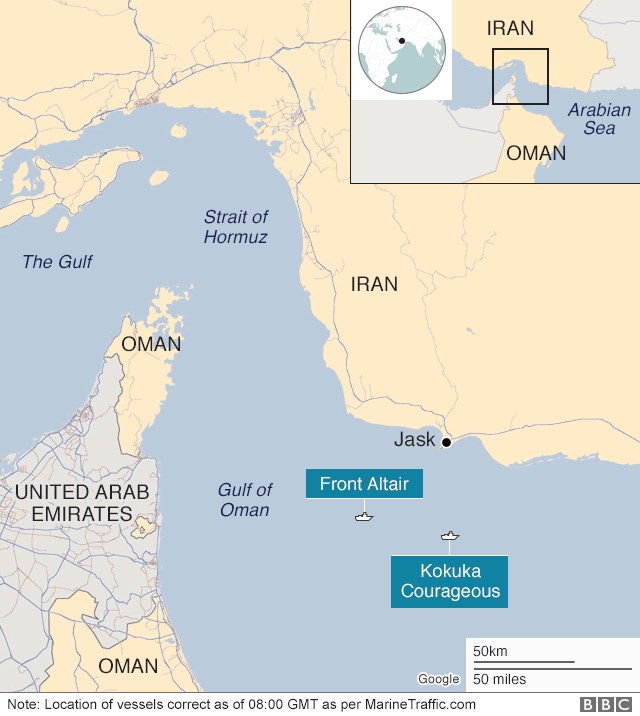
Friday June 14, 2019
By Jonathan Marcus
Already the US and Iran have two totally contradictory assessments of the attacks on the two tankers.
US Secretary of State Mike Pompeo has swiftly and categorically pointed the finger of blame at Tehran.
"This assessment," he said, was "based on intelligence, the weapons used, the level of expertise needed to execute the operation, recent similar Iranian attacks on shipping, and the fact that no proxy group operating in the area has the resources and proficiency to act with such a high degree of sophistication".
It is a pretty damning verdict - but as yet little detail has been given as to the exact nature of the intelligence and the extent to which a forensic analysis of the damage to the two tankers is backed up by other information: satellite or other tracking of the movements of any other vessels involved and so on.
And it is clear that if the US intends a response, especially a military one, then many countries - even friendly governments - will want to have chapter and verse on exactly what the US intelligence amounts to.

Iran's Islamic Revolution Guards is estimated to have more than 150,000 active personnel
Iran for its part was quick to deny any involvement in Thursday's incidents.
Indeed, it sought to deflect blame by arguing in effect that it was being framed.
"Somebody," an Iranian official asserted, "is trying to destabilise relations between Iran and the international community."
However, the burden of the US case goes way beyond this most recent attack.
Iran, the Trump administration insists, has form. The US has already claimed an Iranian hand in the limpet-mine attacks against other tankers a month ago.
Mr Pompeo made an expansive case insisting that "taken as a whole, these unprovoked attacks present a clear threat to international peace and security, a blatant assault on the freedom of navigation, and an unacceptable campaign of escalating tension".
These are hefty charges, and the question inevitably follows what is the US prepared to do about it?
Concerted diplomatic action might be one approach; an effort to marshal international condemnation together with an effort to further isolate Iran through additional economic sanctions.
But there is little doubt that stepped up sanctions have contributed to the current situation, increasing the pressure on Tehran, perhaps to the extent that some elements in the country - perhaps the Revolutionary Guard Corps which maintains autonomous naval forces of its own - has decided to strike back.
Whoever carried out the tanker attacks, tensions are inevitably running high.
Could the US seek to take some kind of punitive military response?
What will be the view of its allies among the Gulf states and farther afield?
And what could be the consequences of military action?
Dangerous times
There could be a very real danger of Iran launching a kind of hybrid war, sporadic and widely dispersed attacks on shipping, sending oil prices and insurance premiums up and perhaps encouraging further punitive responses.
It is an unpalatable prospect for all concerned risking dangerous escalation.
Nobody really thinks that either Iran or the US really wants a full-scale conflict.
For the Americans, despite their considerable military power, an air and maritime war against Iran would raise all sorts of dangers.
President Trump for all his sometimes bellicose rhetoric has so far proved reluctant to take significant military action abroad. US strikes in Syria on his watch were largely symbolic.
The danger, as ever, is for war by accident rather than by design.

Whatever the source of the tanker attacks, Tehran and Washington are signalling to each other - but they may not be receiving quite the messages that each intends.
Iran, for example, may see the US build-up in the region as in part bluster and in part an effort at intimidation in what it sees as its own backyard - intimidation that it is not disposed to accept.
Just suppose elements in the Iranian Guard Corps, for example, misunderstand the signals.
Suppose they believe that they have much more freedom to assert themselves in Gulf waters than the Americans are prepared to accept?
In other words, rather than as they may see it, "pushing at the envelope", they are straying into actions that Washington and its allies will simply not allow to go unpunished?
This is a recipe for conflict, intentional or otherwise. These are dangerous times.
Many of Washington's allies like France and Germany are already urging caution.
In marked contrast a spokesman for Britain's Foreign Office said simply that the British Government "strongly agrees with the US assessment".
But if the US is to consider taking action, then it is going to have to lay out its evidence clearly and persuasively.
Failing this, Mr Trump risks doing even more damage to Washington's fraying ties with some of its longest standing partners.